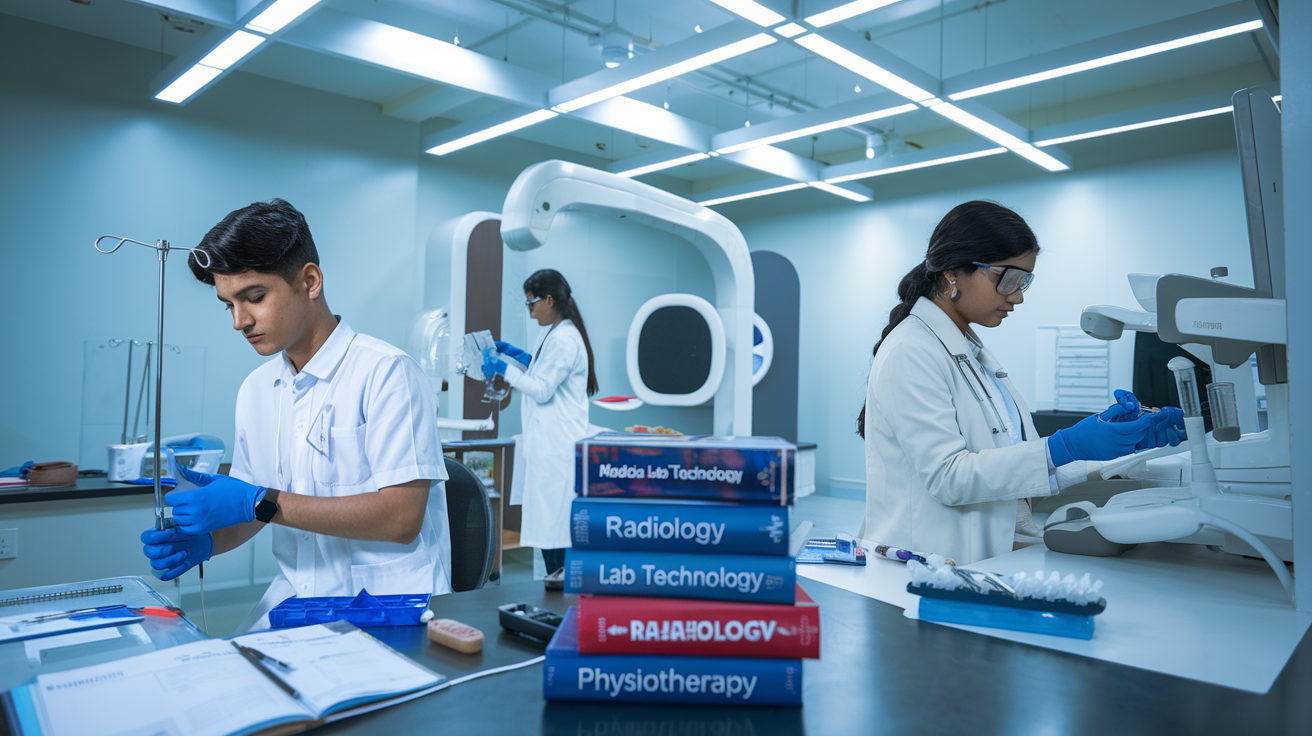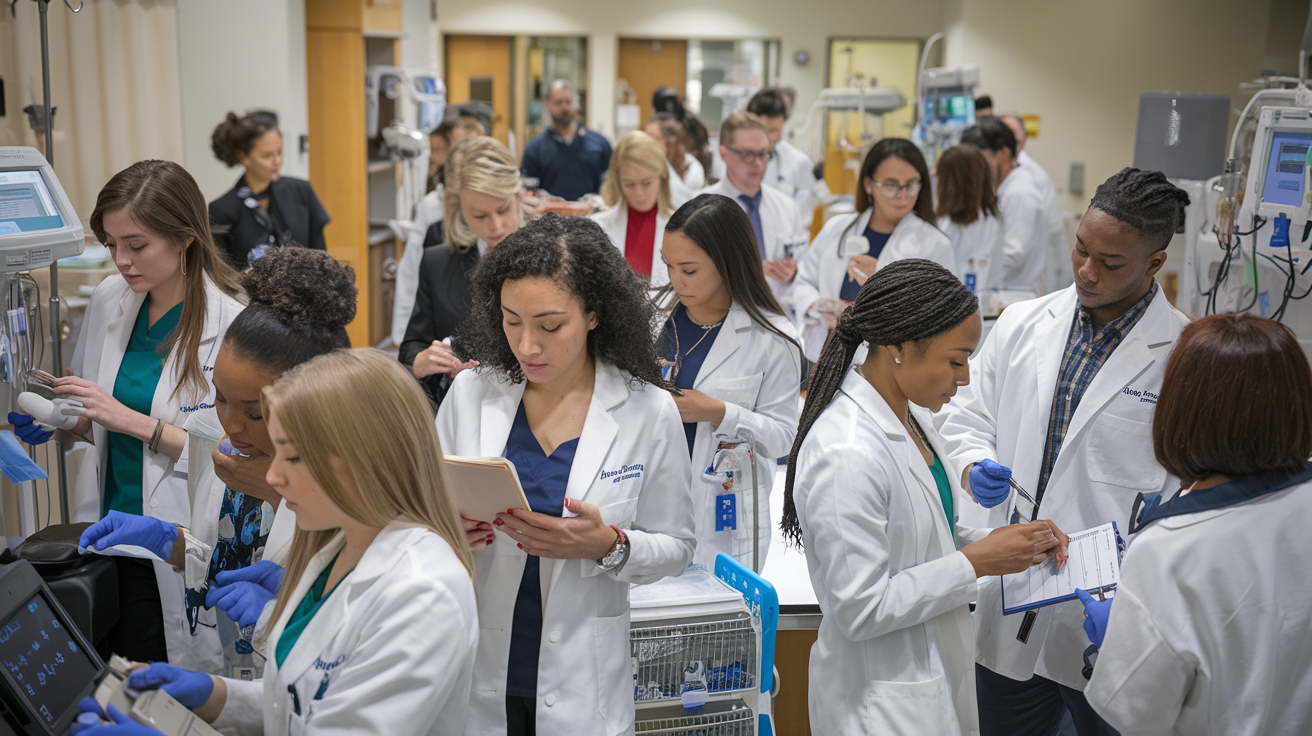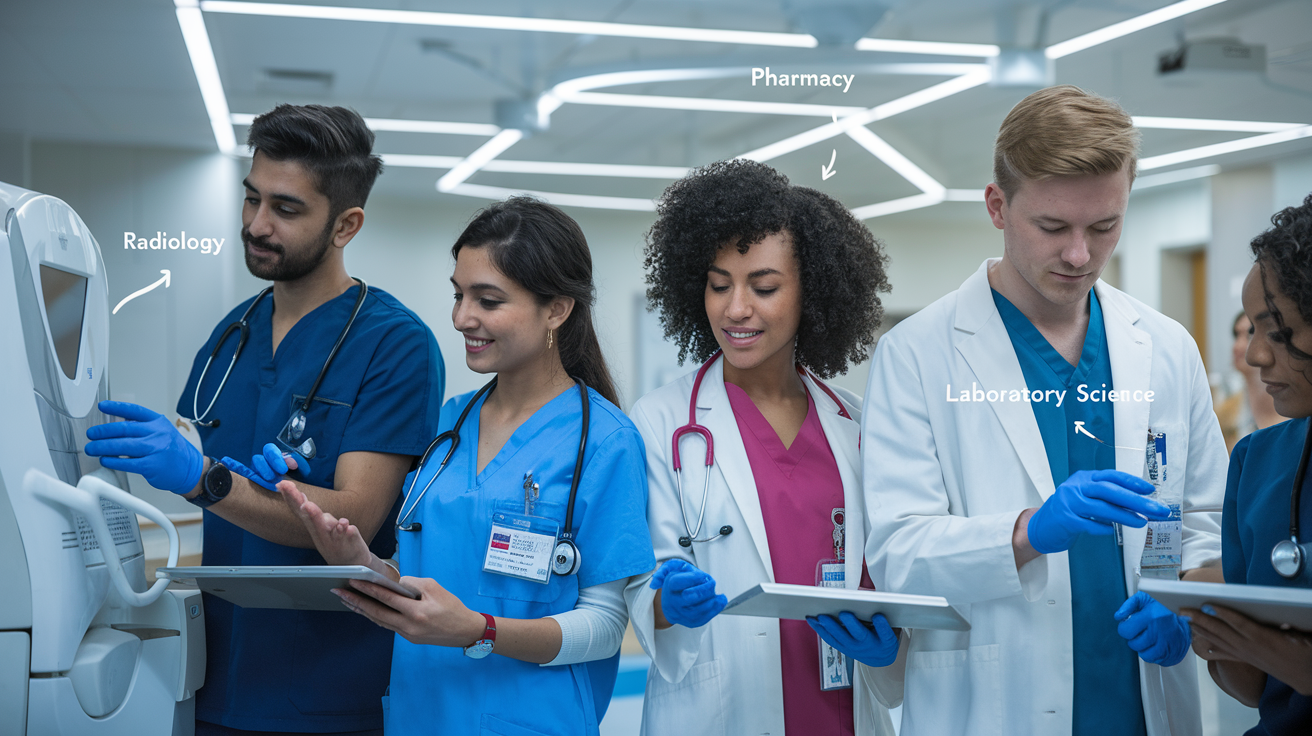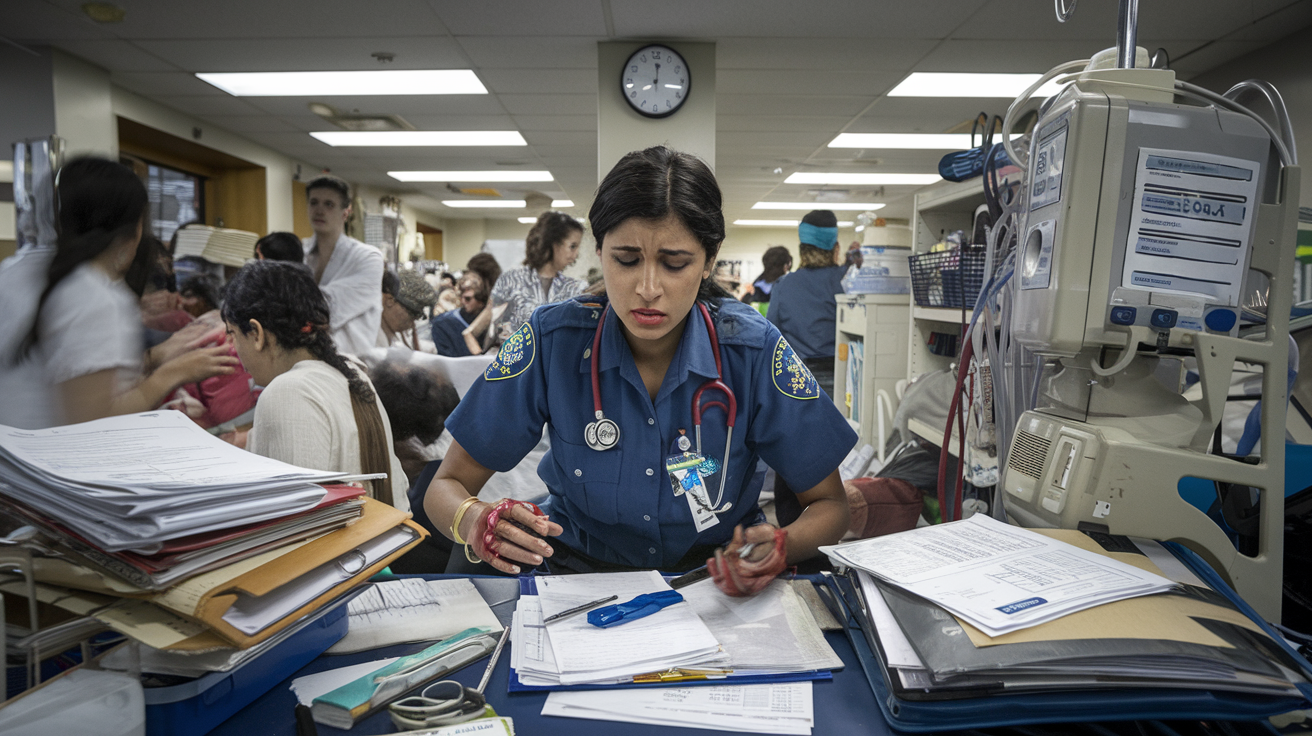Ever wondered why paramedical professionals are called the “backbone of healthcare” yet so many students overlook these high-demand careers? With over 70% of medical diagnoses relying on paramedical test results, these aren’t just support roles—they’re life-saving career paths with serious growth potential.
You’re about to discover everything about paramedical courses in 2025: from admission requirements and fees to the best colleges and career opportunities that could set you up for decades.
The paramedical field isn’t just expanding—it’s exploding with opportunities in diagnostics, therapy, emergency care, and specialized support services.
But here’s what most career counselors won’t tell you about these programs…
The Importance of Paramedical Courses

Why Paramedical Professionals Are Vital to Healthcare
Think about the last time you visited a hospital. Who drew your blood? Who took your X-ray? Who assisted the doctor during your treatment? These weren’t doctors – they were paramedical professionals working behind the scenes to make healthcare possible.
Paramedical courses have become increasingly critical in 2025’s healthcare landscape. With hospitals expanding, specialized care increasing, and patient loads growing, doctors simply can’t do everything alone. They rely on trained paramedical staff who handle specific, essential functions within the healthcare system.
When you choose a paramedical career, you’re not just selecting a job – you’re stepping into a role that directly impacts patient care and health outcomes. You become part of the backbone of modern healthcare.
Growing Demand Creates Unprecedented Opportunities
The healthcare sector is experiencing a massive talent shortage right now. Hospitals, clinics, diagnostic centers, and research facilities are desperately seeking qualified paramedical professionals.
Look at these numbers:
| Healthcare Sector | Projected Growth (2025-2030) | Estimated New Jobs |
|---|---|---|
| Diagnostic Services | 22% | 65,000+ |
| Rehabilitation | 18% | 48,000+ |
| Emergency Care | 25% | 72,000+ |
| Laboratory Services | 20% | 58,000+ |
This growth translates directly to job security and career advancement for you. Unlike many other fields facing uncertainty or automation, paramedical careers are thriving and expected to continue expanding for decades.
The rural healthcare push has created even more opportunities. Government initiatives to strengthen healthcare infrastructure in tier-2 and tier-3 cities mean your paramedical skills are needed virtually everywhere.
Financial Stability Without Long Educational Commitments
One of the biggest advantages of paramedical courses? You can enter the healthcare field without spending 5-7 years in education.
Most paramedical programs take between 6 months to 3 years to complete, depending on your specialization. This means you’re earning while your peers might still be studying.
Starting salaries for paramedical professionals in 2025 are impressive:
| Paramedical Role | Starting Salary Range (Monthly) |
|---|---|
| Medical Lab Technician | ₹25,000 – ₹35,000 |
| Radiographer | ₹30,000 – ₹45,000 |
| Operation Theatre Technician | ₹28,000 – ₹40,000 |
| Dialysis Technician | ₹30,000 – ₹42,000 |
| Cardiac Care Technician | ₹32,000 – ₹48,000 |
With 3-5 years of experience, these figures typically increase by 40-60%. Add specialized certifications or management responsibilities, and your earning potential grows significantly.
Diverse Career Paths to Match Your Interests
The beauty of paramedical education is its diversity. You’re not locked into a single career path – you can choose from dozens of specializations based on your interests, strengths, and goals.
Are you detail-oriented and methodical? Laboratory sciences might be perfect for you. More hands-on and quick-thinking? Emergency medical services could be your calling. Enjoy technology and visualization? Radiography and imaging present exciting opportunities.
Some of the most in-demand paramedical specializations in 2025 include:
- Operation Theatre Technology: Assisting surgeons with equipment, preparing the OT, and ensuring sterile conditions
- Medical Laboratory Technology: Performing crucial diagnostic tests that inform treatment decisions
- Radiology & Imaging: Operating sophisticated equipment to capture images that aid diagnosis
- Emergency Medical Services: Providing critical first-response care in emergency situations
- Rehabilitation Therapy: Helping patients recover functionality after illness or injury
- Dialysis Technology: Supporting patients with kidney failure through life-sustaining treatments
Each of these fields offers its own career progression ladder, allowing you to advance from technician to specialist to supervisor or manager over time.
Global Mobility and International Opportunities
Your paramedical qualification doesn’t limit you to working in India. Healthcare systems worldwide are experiencing similar shortages, creating international opportunities for well-trained paramedical professionals.
Countries like Canada, Australia, the UK, Germany, and the Gulf nations actively recruit paramedical staff from India. Many offer fast-track visa programs specifically for healthcare workers.
If working abroad interests you, choosing programs with international accreditation or partnering institutions can give you an edge. Some paramedical courses now include international certification preparation as part of their curriculum.
Contributing to Public Health and Community Wellbeing
When you work in a paramedical role, you directly contribute to improving public health outcomes. This brings a level of job satisfaction that few other careers can match.
In rural and underserved areas, paramedical professionals often become the primary healthcare providers. You might be the first point of contact for many patients, providing essential services when doctors are unavailable.
Public health initiatives, vaccination drives, health awareness campaigns, and community screening programs all rely heavily on paramedical staff. Your work extends beyond hospital walls into the community, making real differences in people’s lives.
Technology Integration Creates New Specializations
Healthcare technology is evolving rapidly, and paramedical professionals are at the forefront of this revolution. New equipment, diagnostic tools, and treatment technologies require specialized training – creating entirely new career paths.
Some cutting-edge paramedical specializations that have emerged in 2025:
- AI Healthcare Assistants: Supporting AI diagnostic systems and bridging the gap between technology and healthcare providers
- Telemedicine Technicians: Facilitating remote consultations and monitoring for patients in distant locations
- 3D Bioprinting Specialists: Operating advanced tissue and organ printing equipment for transplantation and research
- Robotic Surgery Assistants: Supporting surgeons using robotic surgical systems
- Genetic Testing Technicians: Performing and interpreting genetic tests for personalized medicine
These technology-focused roles often command higher salaries and offer exciting opportunities to work with cutting-edge innovations.
Entrepreneurial Possibilities in Paramedical Services
Your paramedical qualification can also be the foundation for entrepreneurship. Many paramedical professionals have successfully established their own businesses:
- Independent diagnostic laboratories
- Home healthcare services
- Medical equipment supply companies
- Healthcare staffing agencies
- Specialized training centers for paramedical students
With some experience and business acumen, you can transition from employee to employer, building a healthcare business that serves your community while providing financial independence.
Making Your Decision
Choosing a paramedical course is more than selecting a career path – it’s deciding to become an essential part of the healthcare ecosystem. You’ll gain specialized skills, job security, good income potential, and the satisfaction of helping others during their most vulnerable moments.
As you explore specific paramedical courses, consider your personal interests, strengths, and long-term goals. Each specialization offers unique advantages and career trajectories. The healthcare system needs all these roles filled by dedicated professionals like you.
The paramedical field isn’t just growing – it’s transforming. By joining this dynamic sector, you position yourself at the intersection of healthcare, technology, and human service – a powerful combination for a rewarding career.
Types of Paramedical Courses

Certificate Courses
Looking to start your paramedical career quickly? Certificate courses are your fastest route into the healthcare field. These programs typically run from 6 months to 1 year and give you the essential skills needed for entry-level positions.
You’ll find certificate options in areas like:
- Phlebotomy (blood collection)
- ECG/EKG technology
- Emergency Medical Technician (EMT)
- Dental assistant
- Medical lab assistant
- Pharmacy assistant
These courses are perfect if you’re testing the waters in healthcare or need to start earning quickly. Many hospitals and clinics readily hire certificate holders for support roles, and you can always upgrade your qualifications later while working.
The best part? Most certificate programs cost between ₹15,000 to ₹50,000 – significantly less than longer programs. Many institutes also offer evening and weekend classes, so you can train while keeping your current job.
Diploma Courses
Diploma courses give you a more comprehensive understanding of your chosen paramedical field. Running 1-2 years, these programs dive deeper into both theory and practical skills.
Popular diploma options for 2025 include:
| Course | Duration | Average Fees (₹) |
|---|---|---|
| Diploma in Medical Laboratory Technology | 2 years | 40,000-80,000 |
| Diploma in Operation Theatre Technology | 2 years | 50,000-90,000 |
| Diploma in Radiography | 2 years | 60,000-100,000 |
| Diploma in Dialysis Technology | 1-2 years | 45,000-85,000 |
| Diploma in Optometry | 2 years | 50,000-90,000 |
With a diploma, you’ll qualify for more technical roles with better pay compared to certificate holders. Many government hospitals specifically look for diploma-qualified candidates for permanent positions.
The hands-on training in these courses is particularly valuable – you’ll spend significant time in clinical settings learning real-world skills under supervision. This practical experience makes a huge difference when you’re job hunting.
Undergraduate Degree Courses
Want to aim higher in your paramedical career? Bachelor’s programs offer the most comprehensive education and open doors to supervisory roles and better salaries.
These programs typically take 3-4 years to complete and cover advanced concepts, research methodologies, and specialized clinical training. You’ll emerge with both deeper knowledge and critical thinking skills that employers value.
Top undergraduate paramedical courses include:
- Bachelor of Science in Medical Laboratory Technology (B.Sc MLT)
- Bachelor of Physiotherapy (BPT)
- Bachelor of Occupational Therapy (BOT)
- Bachelor of Science in Radiography
- Bachelor of Science in Operation Theatre Technology
- Bachelor of Science in Cardiovascular Technology
- Bachelor of Science in Respiratory Therapy
- Bachelor of Optometry (B.Optom)
- Bachelor of Audiology and Speech Language Pathology (BASLP)
- Bachelor of Prosthetics and Orthotics
The average fee structure ranges from ₹80,000 to ₹3,00,000 per year depending on the institute and specialization. While this represents a bigger investment, the return is substantial – bachelor’s degree holders typically earn 40-60% more than diploma holders in the same field.
An added advantage: many hospitals have promotion policies that favor degree holders, putting you on a faster track to senior positions.
Post-Graduate Courses
Already have a paramedical degree? Taking your education to the master’s level can transform your career trajectory. These specialized 2-year programs prepare you for leadership roles, teaching positions, and research opportunities.
You’ll gain advanced clinical expertise while developing management and research skills that set you apart. Many postgraduate students also participate in publishing research papers – a significant credential for your resume.
Popular postgraduate options in 2025:
- Master of Physiotherapy (MPT)
- Master of Science in Medical Laboratory Technology (M.Sc MLT)
- Master of Occupational Therapy (MOT)
- Master of Optometry (M.Optom)
- Master in Audiology and Speech Language Pathology (MASLP)
- Master of Science in Radiography
- Master of Science in Cardiovascular Technology
These programs often include specialized tracks, allowing you to focus on niche areas like:
- Neurological rehabilitation
- Sports physiotherapy
- Molecular diagnostics
- Clinical research
- Healthcare administration
The investment typically ranges from ₹1,00,000 to ₹4,00,000 per year, but the returns are substantial. With a master’s degree, you can aim for positions as department heads, clinical researchers, educators, or consultants – roles that often pay 2-3 times what entry-level paramedical staff earn.
Short-Term Specialization Courses
Already working in healthcare but want to expand your skills? Short-term specialization courses are designed for working professionals looking to add specific capabilities to their resume.
These courses typically run from 2 weeks to 6 months and focus on targeted skills like:
- Advanced cardiac life support
- Dialysis management
- Ventilator operation
- Specialized imaging techniques
- Geriatric care
- Neonatal care
- Infection control protocols
The beauty of these programs is their flexibility – many are offered on weekends or through blended learning formats combining online and in-person training. Fees range from ₹10,000 to ₹75,000 depending on the specialization.
Adding these credentials can make you significantly more valuable to employers. For example, a general radiography technician who gets certified in MRI operation can see a 20-30% salary increase immediately.
Distance Learning Paramedical Courses
Balancing work, family, and education? Distance learning programs offer the flexibility you need to advance your career without putting your life on hold.
These programs combine online learning with periodic practical sessions at designated centers. While not all paramedical courses can be effectively taught remotely (due to the hands-on nature of many skills), several institutions now offer quality distance options for:
- Health information management
- Medical coding and billing
- Healthcare administration
- Nutrition and dietetics
- Medical transcription
- Public health
Before enrolling, make sure to verify that the distance learning program is recognized by relevant healthcare authorities. The best programs maintain strict quality standards and arrange supervised clinical practicums near your location.
The cost advantage is significant – distance learning programs typically cost 30-50% less than their on-campus counterparts while allowing you to maintain your income.
Industry-Specific Paramedical Courses
The healthcare landscape is constantly evolving, creating demand for specialized paramedical professionals in emerging fields. Industry-specific courses prepare you for these niche opportunities.
Some cutting-edge options for 2025:
-
Genetic Counseling Assistant Programs: With advances in genetic testing, trained professionals who can help explain results and implications to patients are in high demand.
-
Robotics Assistance Technology: Learn to operate and maintain robotic surgical systems that are becoming common in advanced hospitals.
-
Telemedicine Coordination: Develop skills to facilitate remote patient monitoring and virtual consultations – a rapidly growing field.
-
Sports Medicine Technology: Specialize in supporting athletes with injury prevention, treatment, and performance optimization.
-
Geriatric Care Technology: Focus on the unique healthcare needs of the elderly population, which is growing rapidly in India.
These specialized programs typically offer excellent job prospects with starting salaries 25-40% higher than general paramedical roles, simply because the talent pool is smaller and the skills more specialized.
Eligibility Criteria for Paramedical Courses

Educational Requirements for Paramedical Courses
Looking to start your journey in the paramedical field in 2025? Understanding the eligibility criteria is your first step toward a successful career. The requirements vary based on the course level and specialization you’re eyeing. Here’s everything you need to know about qualifying for paramedical programs.
Basic Qualification Requirements
For most paramedical courses, you’ll need to have completed your 10+2 education with Science subjects. Physics, Chemistry, and Biology are typically mandatory, though some courses might accept Mathematics as an alternative to Biology. Your marks matter too – most institutions require a minimum aggregate of 50% in your qualifying examination.
If you’re from a reserved category (SC/ST/OBC), you might benefit from relaxation in the minimum percentage requirement. This typically ranges from 5-10% depending on the institution and state policies.
Age Requirements
Age restrictions apply to most paramedical courses:
- Minimum age: Usually 17 years as of December 31, 2025
- Maximum age: Generally 25-30 years, with relaxation for reserved categories
Don’t worry if you’re slightly outside these ranges – many private institutions offer more flexibility with age criteria compared to government colleges.
Course-Specific Eligibility Criteria
Different paramedical courses have specific requirements tailored to their specialization:
Certificate Courses
- Duration: 6 months to 1 year
- Qualification: 10th or 12th pass (depending on the course)
- Example courses: Medical Laboratory Technician (Basic), First Aid, Home Nursing
Diploma Courses
- Duration: 1-2 years
- Qualification: 12th with PCB and minimum 50% marks
- Popular options: Diploma in Medical Laboratory Technology, Diploma in X-Ray Technology, Diploma in Operation Theatre Technology
Bachelor’s Degree Courses
- Duration: 3-4 years
- Qualification: 12th with PCB and minimum 50-55% marks
- Major programs: Bachelor of Physiotherapy (BPT), B.Sc. in Medical Laboratory Technology, B.Sc. in Radiology
Post-Graduate Courses
- Duration: 2 years
- Qualification: Relevant bachelor’s degree with minimum 50% marks
- Examples: M.Sc. in Medical Laboratory Technology, Master of Physiotherapy (MPT)
Specialty-Based Requirements
The eligibility criteria also vary based on the paramedical specialty you choose:
Medical Laboratory Technology
- 12th with PCB (minimum 50%)
- Strong interest in laboratory procedures
- Good eyesight and color vision (for microscopic examinations)
Radiology & Imaging Technology
- 12th with Physics as mandatory subject
- No color blindness
- Physical fitness to handle equipment
Physiotherapy
- 12th with Biology (minimum 55% recommended)
- Physical fitness to demonstrate and perform exercises
Operation Theatre Technology
- 12th with PCB (minimum 50%)
- No history of contagious diseases
- Good mental and physical health
Emergency Medical Technology
- 12th with PCB (minimum 50%)
- Physical fitness for emergency response
- Valid driver’s license often preferred
Entrance Examination Requirements
Most reputable paramedical institutions require you to clear an entrance examination. These tests assess your knowledge in:
- Physics
- Chemistry
- Biology
- General Awareness
- Basic Mathematics
- Logical Reasoning
Some of the prominent entrance exams for paramedical courses in 2025 include:
-
AIIMS Paramedical Entrance Exam
- Conducted by All India Institute of Medical Sciences
- For admission to various paramedical courses at AIIMS campuses
-
PGIMER Paramedical Entrance Exam
- Conducted by Postgraduate Institute of Medical Education and Research, Chandigarh
- Highly competitive for quality paramedical education
-
JIPMER Paramedical Entrance Exam
- Conducted by Jawaharlal Institute of Postgraduate Medical Education and Research
- Tests your knowledge of science subjects and general aptitude
-
State-Level Paramedical Entrance Exams
- Conducted by various state governments
- Requirements vary by state
You’ll need to register for these exams well in advance, typically 2-3 months before the examination date. The application process is usually online, requiring your educational certificates, ID proof, and photographs.
Language Proficiency
While not always explicitly stated, proficiency in English is important for most paramedical courses as textbooks and instruction are primarily in English. Some state institutions may offer programs in regional languages as well.
For international students, additional English proficiency tests like IELTS or TOEFL might be required, with a minimum score specified by the institution.
Physical Fitness Requirements
Given the hands-on nature of paramedical work, many institutions require:
- Medical fitness certificate from a registered medical practitioner
- No major physical disabilities that might hinder practical work
- Good eyesight (with or without glasses)
- No color blindness (especially important for laboratory courses)
Special Considerations for Working Professionals
If you’re already working in the healthcare sector and looking to upgrade your skills, some institutions offer:
- Weekend or evening classes
- Relaxed age criteria
- Experience-based admission without entrance exams
- Credit for prior learning or experience
Lateral Entry Options
Already have a related diploma or certificate? You might qualify for lateral entry into bachelor’s programs, typically entering directly into the second year. This can save you time and money while advancing your qualifications.
Requirements for lateral entry typically include:
- Completion of a relevant diploma program
- Minimum 55-60% marks in the diploma
- Bridging courses might be required
Reservation Policies
Government institutions follow reservation policies as per central or state government guidelines:
- SC/ST categories: Usually 15% and 7.5% respectively
- OBC: 27% reservation
- EWS: 10% reservation
- Persons with Disabilities: 5% horizontal reservation
Make sure to check the specific reservation policy of your target institution and keep the required certificates ready during the application process.
Documentation Required
When applying, you’ll typically need to submit:
- 10th and 12th mark sheets and certificates
- Transfer certificate from last attended institution
- Character certificate
- Category certificate (if applicable)
- Recent passport-sized photographs
- ID proof (Aadhaar card/passport/voter ID)
- Medical fitness certificate
Remember to keep multiple copies of all documents and have them attested as required by the institution.
Admission Process for Paramedical Courses

Understanding Paramedical Admission Requirements
Ready to start your journey into paramedical studies in 2025? The admission process for paramedical courses can seem overwhelming at first, but breaking it down step by step makes it manageable. Most paramedical institutions follow a similar pattern for admissions, though specific requirements may vary depending on the course and college you’re applying to.
Eligibility Criteria
Before you apply, make sure you meet these basic eligibility requirements:
- Educational Qualification: You’ll need to have completed 10+2 with Physics, Chemistry, and Biology (PCB) from a recognized board. Some courses may accept Mathematics instead of Biology.
- Minimum Percentage: Most institutes require at least 50% aggregate marks in your qualifying examination (45% for reserved categories).
- Age Limit: Typically, you should be at least 17 years old as of December 31, 2025. The upper age limit varies by institution but is usually around 30-35 years.
- Additional Requirements: Some specialized courses may have additional prerequisites or preferred subject combinations.
Application Process Timeline
Mark these important dates on your calendar for the 2025 admission cycle:
| Timeline | Activities |
|---|---|
| January-February 2025 | Application forms release for most institutions |
| March-April 2025 | Entrance exam registration deadlines |
| May-June 2025 | Entrance examinations conducted |
| July 2025 | Results declaration and counseling process begins |
| August-September 2025 | Final admissions and academic session starts |
Entrance Examinations
Getting through the entrance exam is your ticket to paramedical education. Here are the major exams you should prepare for:
National Level Exams
-
NEET 2025: Though primarily for medical courses, many top paramedical institutions accept NEET scores for admission.
-
AIIMS Paramedical Entrance Exam: Specifically for paramedical courses at AIIMS institutes across India.
-
JIPMER Paramedical Entrance Test: For admission to paramedical courses at JIPMER, Puducherry.
-
PGIMER Paramedical Entrance Exam: Conducted by Post Graduate Institute of Medical Education and Research, Chandigarh.
State Level Exams
Many states conduct their own paramedical entrance tests:
- UP Paramedical Entrance Exam
- Bihar Paramedical Entrance Test
- Maharashtra Paramedical CET
- Karnataka Paramedical Entrance Test
- West Bengal Paramedical Entrance Examination
Application Submission Process
Here’s how to submit your application without missing any important steps:
-
Online Registration: Visit the official website of your chosen institution or entrance exam.
-
Form Filling: Complete all required fields accurately. Double-check your personal details, educational qualifications, and contact information.
-
Document Upload: You’ll typically need to upload:
- Passport-sized photograph
- Signature
- 10th and 12th mark sheets
- Category certificate (if applicable)
- ID proof
-
Application Fee Payment: Fees range from ₹500 to ₹2,000 depending on the institution and your category. Payment is usually accepted through credit/debit cards, net banking, or UPI.
-
Confirmation: Save and print your application form and payment receipt for future reference.
Counseling Process
After clearing the entrance exam, you’ll go through counseling, which is how seats are allocated. The process typically works like this:
-
Merit List Publication: Institutions release merit lists based on entrance exam scores.
-
Registration for Counseling: You’ll need to register for the counseling process, which may require an additional fee.
-
Choice Filling: You’ll be asked to select and rank your preferred courses and colleges.
-
Seat Allocation: Seats are allocated based on your rank, preferences, and availability.
-
Document Verification: You’ll need to present original documents for verification.
-
Fee Payment: Secure your seat by paying the admission fee within the specified deadline.
-
Reporting to the Institution: Finally, report to your assigned college with all required documents by the given date.
Direct Admission Options
Not all paramedical courses require entrance exams. You might find these direct admission pathways:
-
Merit-Based Admissions: Some private colleges offer admission based on your 10+2 or equivalent examination scores.
-
Management Quota: Private institutions often reserve a certain percentage of seats under management quota, though these typically come with higher fees.
-
Institute-Level Entrance Tests: Smaller colleges may conduct their own entrance tests instead of relying on national or state-level exams.
Required Documents
When applying and during admission, keep these documents handy:
- 10th and 12th mark sheets and certificates (original and photocopies)
- Transfer Certificate/School Leaving Certificate
- Character Certificate from your last attended institution
- Migration Certificate (if changing boards/universities)
- Category Certificate (SC/ST/OBC/EWS) if applicable
- Disability Certificate (if applicable)
- Domicile Certificate (for state quota seats)
- Passport-sized photographs (8-10)
- ID proof (Aadhaar Card/Passport/Voter ID)
- Income Certificate (for scholarship applicants)
Special Reservation Categories
Take advantage of special reservation quotas if you’re eligible:
- SC/ST/OBC Reservations: Most institutions follow government norms for caste-based reservations.
- PwD (Persons with Disabilities): Up to 5% horizontal reservation is typically available.
- EWS (Economically Weaker Sections): 10% reservation as per government guidelines.
- State Domicile Quotas: Many colleges reserve seats for local students.
- NRI/Foreign Nationals Quota: Select institutions offer seats specifically for NRIs or international students.
Scholarship Opportunities
Don’t let financial constraints hold you back. Explore these scholarship options:
- Government Scholarships: Various central and state government scholarships are available for paramedical students.
- Institution-Specific Scholarships: Many colleges offer merit-based or need-based scholarships.
- Private Scholarships: Several NGOs and corporate houses provide financial assistance to deserving students.
- Bank Education Loans: Most major banks offer education loans for paramedical courses with competitive interest rates.
Tips for a Successful Application
Maximize your chances of getting into your dream paramedical program with these tips:
-
Start Early: Begin your research and preparation at least a year in advance.
-
Follow Multiple Paths: Apply to different institutions and through various entrance exams to increase your chances.
-
Stay Updated: Regularly check official websites for any changes in admission procedures or important dates.
-
Prepare Thoroughly: Balance your entrance exam preparation with maintaining good grades in your qualifying examination.
-
Keep Documents Ready: Arrange all required documents well in advance to avoid last-minute hassles.
-
Professional Guidance: Consider seeking advice from career counselors or education consultants specializing in paramedical courses.
-
Visit Campus: If possible, visit the campuses you’re interested in to get a feel for the environment and facilities.
-
Connect with Alumni: Reach out to former students to understand the real-world experience of studying at your target institutions.
The paramedical field offers promising career opportunities with the healthcare sector’s continuous growth. With careful planning and timely action, you can secure admission to a quality paramedical program that aligns with your career goals and sets you up for success in this rewarding field.
Course Duration

Duration of Certificate & Diploma Paramedical Courses
Wondering how long you’ll need to study for a paramedical course? The duration varies depending on the program level and specialization you choose. Certificate courses typically take 6 months to 1 year, while diploma programs generally run for 1-2 years.
Here’s a breakdown of the most common paramedical course durations:
| Course Type | Duration | Eligibility |
|---|---|---|
| Certificate | 6 months – 1 year | 10+2 with Science |
| Diploma | 1-2 years | 10+2 with Science |
| Advanced Diploma | 2-3 years | 10+2 with Science |
| Bachelor’s Degree | 3-4 years | 10+2 with PCB/Science |
| Master’s Degree | 2 years | Relevant Bachelor’s degree |
Short-Term Paramedical Courses (6 months – 1 year)
If you’re looking to enter the healthcare field quickly, short-term certificate courses are your best bet. These programs are designed to give you practical skills in a specific area without spending years in school.
Some popular short-term paramedical courses include:
- Medical Laboratory Technician (Certificate): 6-12 months
- ECG Technician Course: 6 months
- First Aid and Emergency Medical Technician: 3-6 months
- Phlebotomy Technician: 3-6 months
- Healthcare Assistant: 6 months
- Operation Theatre Assistant: 6-12 months
These courses are perfect if you want to test the waters in healthcare before committing to longer programs, or if you need to start earning quickly. Many hospitals and diagnostic centers hire certificate holders for entry-level positions.
Medium-Term Paramedical Courses (1-2 years)
Diploma courses offer more comprehensive training and better job prospects compared to certificate programs. The extended duration allows for deeper theoretical knowledge and more hands-on practical experience.
Popular diploma paramedical courses include:
- Diploma in Medical Laboratory Technology: 1-2 years
- Diploma in Radiology: 2 years
- Diploma in Operation Theatre Technology: 2 years
- Diploma in Dialysis Technology: 2 years
- Diploma in Critical Care Technology: 2 years
- Diploma in Optometry: 2 years
- Diploma in Dental Hygiene: 2 years
With a diploma, you’ll qualify for more responsible roles and better starting salaries. Many students find that the additional year of training significantly enhances their career prospects.
Long-Term Paramedical Courses (3-4 years)
Bachelor’s degree programs in paramedical sciences offer the most comprehensive education and best long-term career opportunities. These programs combine in-depth theoretical knowledge with extensive clinical practice.
Common bachelor’s degree programs include:
- Bachelor of Science in Medical Laboratory Technology (B.Sc. MLT): 3 years
- Bachelor in Physiotherapy (BPT): 4.5 years (including 6 months internship)
- Bachelor of Science in Radiography: 3-4 years
- Bachelor of Optometry (B.Optom): 4 years
- Bachelor of Science in Operation Theatre Technology: 3 years
- Bachelor of Science in Cardiac Care Technology: 3-4 years
- Bachelor of Occupational Therapy (BOT): 4.5 years (including internship)
These degrees open doors to supervisory positions, research opportunities, and the option to pursue master’s programs later.
Part-Time vs. Full-Time Study Options
You’re not limited to traditional full-time study. Many institutions now offer flexible learning options to accommodate working professionals or those with other commitments:
- Part-time courses: Usually double the duration of full-time courses
- Weekend programs: Classes held only on weekends, extending the total duration
- Evening classes: For those who work during the day
- Distance learning: For some theoretical components, though practical training remains in-person
Remember that part-time options may extend your total study time, but they allow you to earn while you learn.
Internship Periods
One aspect that’s often overlooked when considering course duration is the mandatory internship period. Most paramedical programs include an internship component that may or may not be included in the stated course duration:
- Certificate courses: 1-3 months internship (sometimes optional)
- Diploma courses: 3-6 months internship
- Bachelor’s degrees: 6-12 months internship
During your internship, you’ll work in actual healthcare settings under supervision, applying what you’ve learned and gaining crucial real-world experience. This period is often paid (though minimally) and forms a critical part of your training.
Accelerated Programs
In a hurry to start your career? Some institutes offer accelerated programs that compress the curriculum into a shorter timeframe. These intensive courses require full-time commitment and rigorous study:
- Accelerated MLT certificate: 4 months (instead of 6)
- Fast-track Radiology diploma: 18 months (instead of 24)
- Intensive Emergency Care: 2 months (instead of 3)
Be aware that these programs demand more of your time each week and provide less flexibility. They’re best suited for students who can fully commit to their studies without other major responsibilities.
Duration Based on Specialization
The length of your paramedical course also depends on the complexity of the specialization you choose:
Shorter Duration Specializations (6-12 months):
- Phlebotomy
- ECG Technology
- Basic Emergency Care
- Medical Transcription
Medium Duration Specializations (1-2 years):
- Medical Laboratory Technology
- Dialysis Technology
- Operation Theatre Technology
- Respiratory Therapy
Longer Duration Specializations (3-4 years):
- Physiotherapy
- Occupational Therapy
- Radiography & Imaging Technology
- Optometry
- Prosthetics & Orthotics
Choose your specialization based not just on duration but on your interests, aptitude, and career goals.
Post-Qualification Specialization Courses
After completing your initial paramedical qualification, you might want to add specialized skills through short courses:
- Advanced ECG Interpretation: 2 months after ECG Technician course
- Specialized Radiography Techniques: 3-6 months after Radiology diploma
- Neonatal Care: 3 months after Nursing diploma
- Advanced Life Support: 1-2 months after EMT certification
These add-on qualifications can significantly boost your employability and earning potential with a relatively small additional time investment.
Remember, while the duration of your course is important, the quality of training and the reputation of your institute matter even more. A well-structured 2-year diploma from a reputable institution may serve you better than a 3-year degree from an unrecognized college. Always check accreditation status and placement records before enrolling.
Curriculum and Subjects

Core Paramedical Curriculum Structure
Wondering what you’ll actually study in paramedical courses? The curriculum typically combines theoretical knowledge with practical skills—giving you hands-on experience that prepares you for real healthcare scenarios. Most paramedical programs follow a semester pattern with 6-8 semesters depending on the course duration.
Your studies will typically include:
- Theory Classes: Classroom lectures covering medical concepts, anatomy, physiology, and specialized knowledge
- Practical Labs: Hands-on training with medical equipment and procedures
- Clinical Rotations: Real-world experience in hospitals and healthcare facilities
- Internships: Required in most courses to gain professional experience
- Project Work: Research-based assignments to develop analytical skills
Common Subjects Across Paramedical Courses
No matter which paramedical program you choose, you’ll encounter some fundamental subjects that build your healthcare foundation:
- Human Anatomy & Physiology: Learn how the human body is structured and functions
- Biochemistry: Understand chemical processes within living organisms
- Pathology: Study diseases and their effects on body systems
- Microbiology: Explore microorganisms and their role in health and disease
- Pharmacology: Learn about drugs, their properties, and effects on the body
- Medical Ethics: Understand professional conduct and patient rights
- First Aid & Emergency Care: Master life-saving techniques
- Hospital Management: Learn basics of healthcare administration
- Communication Skills: Develop patient interaction abilities
- Computer Applications: Gain digital literacy for medical record systems
Course-Specific Subjects
Different paramedical programs focus on specialized subjects relevant to their field. Here’s what you can expect in some popular courses:
Medical Laboratory Technology (MLT)
In MLT programs, you’ll dive into diagnostic techniques with subjects like:
- Clinical Pathology
- Hematology
- Histopathology
- Blood Banking
- Clinical Biochemistry
- Immunology
- Cytology
- Medical Microbiology
- Laboratory Management
Your practical sessions will involve handling various testing equipment and learning sample collection techniques that you’ll use daily in your professional life.
Radiography & Imaging Technology
When pursuing radiography, your curriculum emphasizes:
- Radiographic Techniques
- Radiation Physics
- Radiation Biology & Protection
- Cross-Sectional Anatomy
- Digital Image Processing
- Ultrasound Physics
- MRI Principles
- CT Scan Technology
- Quality Assurance in Radiology
The practical component includes training on X-ray machines, CT scanners, MRI equipment, and other imaging tools—skills that will make you invaluable in diagnostic departments.
Operation Theater Technology
OT Tech programs prepare you for surgical environments with subjects like:
- Surgical Instrumentation
- Sterilization Techniques
- Anesthesia Technology
- Surgical Procedures
- Operation Theater Management
- Patient Positioning
- Surgical Assistance
- Biomedical Waste Management
- Infection Control
You’ll spend significant time in simulated OT environments, learning to prepare surgical setups and assist during procedures.
Cardiac Care Technology
For those interested in heart health, your curriculum includes:
- Cardiac Anatomy & Physiology
- ECG Technology
- Echocardiography
- Cardiac Catheterization
- Pacemaker Technology
- Cardiovascular Pharmacology
- Cardiac Rehabilitation
- Electrophysiology
- Heart-Lung Machine Operation
Your practical training often takes place in cardiac care units and catheterization labs where you’ll work with sophisticated cardiac equipment.
Emergency Medical Technology (EMT)
EMT programs focus on crisis response with subjects like:
- Emergency Care Principles
- Trauma Management
- Disaster Management
- Advanced Life Support
- Patient Assessment
- Emergency Pharmacology
- Medical Emergencies
- Obstetric & Pediatric Emergencies
- Crisis Intervention
Your practical training includes simulated emergency scenarios and ambulance duties to prepare you for high-pressure situations.
Practical Training Components
What makes paramedical education particularly valuable is its emphasis on hands-on learning. Your practical training typically includes:
- Skills Lab Practice: Where you’ll master techniques before applying them to patients
- Simulation Training: Using mannequins and virtual reality to practice procedures
- Hospital Rotations: Spending time in different departments to gain diverse experience
- Community Health Camps: Participating in public health initiatives
- Case Studies: Analyzing real patient scenarios to develop clinical reasoning
Most programs require 500-1000 hours of practical training depending on the course level and specialization.
Internship Requirements
The internship phase is crucial for your professional development. Typically lasting 6 months to 1 year, internships offer:
- Supervised clinical experience
- Rotation through specialized departments
- Exposure to patient care workflows
- Networking opportunities with healthcare professionals
- Practical application of theoretical knowledge
Many top paramedical colleges have tie-ups with prestigious hospitals, giving you valuable exposure to advanced healthcare settings.
Assessment Methods
Your performance in paramedical courses is evaluated through:
- Semester/Annual Examinations
- Practical Tests
- Clinical Performance Assessments
- Project Work
- Viva Voce (Oral Examinations)
- Internal Assessments
- Skill-based Evaluations
- Case Presentations
- Logbook Maintenance
Most programs require 50-60% marks as the minimum passing criteria, with separate passing requirements for theory and practical components.
Advanced Specialization Options
As you progress in your paramedical education, you might have opportunities for advanced specialization in areas like:
- Critical Care Technology
- Dialysis Technology
- Oncology Technology
- Neuroscience Technology
- Reproductive Technology
- Sports Medicine Technology
- Geriatric Care Technology
These specializations often involve additional certificate courses or post-graduate diplomas that can significantly enhance your career prospects.
Technology Integration in Curriculum
With healthcare becoming increasingly tech-driven, your paramedical curriculum in 2025 will likely include:
- Digital Health Record Management
- Telemedicine Protocols
- AI Applications in Healthcare
- Medical Device Connectivity
- Health Informatics
- Wearable Technology Applications
- Remote Patient Monitoring
Staying current with these technological aspects will make you more adaptable in the evolving healthcare landscape.
Industry-Academia Collaboration
The best paramedical programs feature strong industry connections through:
- Guest lectures by practicing healthcare professionals
- Industry-sponsored laboratories
- Collaborative research projects
- Workshop training with medical equipment manufacturers
- Hospital observation visits
- Medical conferences and seminars
These collaborations help you build professional networks even before you graduate—often leading to placement opportunities.
Continuous Professional Development
Your learning journey doesn’t end with graduation. The paramedical curriculum also introduces you to:
- Continuing Education Requirements
- Professional Certification Pathways
- Research Methodology
- Scientific Paper Writing
- Professional Ethics and Regulations
- Healthcare Management Principles
These elements prepare you for lifelong learning and career advancement in the rapidly evolving healthcare sector.
Practical Training and Internships

Hands-On Clinical Experience
Want to know what makes paramedical courses truly stand out? It’s the hands-on training you’ll get. Unlike purely theoretical degrees, paramedical programs put you right in the action. You’ll practice drawing blood, measuring vital signs, operating diagnostic equipment, and assisting in medical procedures long before you graduate.
Most paramedical institutes have fully equipped labs that mirror real healthcare settings. As a radiology student, you’ll actually operate X-ray machines. In a medical lab technology course, you’ll run tests on real samples. This practical approach means you won’t freeze when facing your first real patient – you’ll already know what to do.
Hospital Rotations
Your paramedical training gets even more real during hospital rotations. These aren’t optional – they’re a crucial part of your education where you’ll spend time in different departments of a hospital.
For instance, if you’re studying to be a respiratory therapist, you’ll rotate through emergency rooms, intensive care units, and pulmonary rehabilitation centers. Each rotation typically lasts 2-4 weeks, giving you enough time to understand workflows and procedures in each department.
During these rotations, you’ll:
- Shadow experienced professionals
- Assist with patient care under supervision
- Learn department-specific protocols
- Observe specialized procedures
- Practice your technical skills in real healthcare environments
The 2025 admission cycle has seen many paramedical institutes expanding their rotation programs to include more specialty areas, giving you broader exposure to potential career paths.
Mandatory Internships
Almost every paramedical course culminates in a mandatory internship period – and this is where the rubber meets the road. These internships typically last 3-6 months, depending on your program.
During this time, you’re not just a student anymore. You become a working member of a healthcare team, applying everything you’ve learned under professional supervision. The difference between rotations and internships? In internships, you take on much more responsibility.
Take a look at typical internship durations for popular paramedical courses in 2025:
| Course | Typical Internship Duration |
|---|---|
| Medical Laboratory Technology | 6 months |
| Radiography | 4-6 months |
| Operation Theater Technology | 4 months |
| Cardiac Care Technology | 6 months |
| Dialysis Therapy | 3-4 months |
| Optometry | 6 months |
Many institutes now offer stipends during these internships, ranging from ₹5,000 to ₹12,000 per month depending on the specialty and location.
Simulation-Based Training
Before you even step into a hospital, you’ll likely train in simulation labs. Think of these as flight simulators for healthcare professionals – safe environments where you can practice without risk to real patients.
Modern paramedical programs use high-fidelity mannequins that can simulate breathing, heartbeats, and various medical conditions. Some even respond to treatments! This technology gives you the confidence to handle emergencies before you encounter them in real life.
Advanced simulation centers also use virtual reality (VR) and augmented reality (AR) technology. Imagine practicing ultrasound procedures with haptic feedback devices that let you feel resistance as you would with a real patient. This technology has become more widespread in paramedical education since 2023, and by 2025, many top institutes include it as a standard part of training.
Industry Partnerships
The best paramedical programs have strong ties with healthcare facilities, equipment manufacturers, and research organizations. These partnerships directly benefit your education.
For example, diagnostic companies often provide the latest equipment to allied health institutions for training purposes. This means you’ll learn on the same machines you’ll use in your career, not outdated technology.
Many programs also arrange for guest lectures from industry professionals who share real-world insights you won’t find in textbooks. Some even organize field visits to medical device manufacturing units or specialized healthcare facilities.
When researching programs for 2025 admission, look at the institute’s industry connections. Schools with strong partnerships often have better placement records and more comprehensive practical training.
Rural Healthcare Exposure
A unique aspect of paramedical training in India is the rural healthcare component. Many institutes now include mandatory rural postings as part of their curriculum.
During these placements, you’ll work in primary health centers or community clinics in underserved areas. This experience is invaluable for several reasons:
- You’ll learn to work with limited resources, improving your problem-solving skills
- You’ll see a wider variety of cases than you might in specialized urban facilities
- You’ll develop communication skills with patients from diverse backgrounds
- You’ll understand healthcare challenges beyond well-equipped hospitals
This exposure makes you a more adaptable and resourceful healthcare professional. Some students discover a passion for rural healthcare during these postings and choose to build their careers serving these communities.
Skill Assessment During Training
Throughout your practical training and internships, your performance won’t just be casually observed – it will be systematically evaluated. Most paramedical programs use competency-based assessment models where you must demonstrate mastery of specific skills.
These assessments typically include:
- Objective Structured Clinical Examinations (OSCEs)
- Logbooks documenting procedures you’ve performed
- 360-degree feedback from supervisors, peers, and sometimes patients
- Case presentations and discussions
- Practical demonstrations of technical skills
This continuous assessment helps identify areas where you need more practice before graduation. By the time you complete your program, you’ll have documented evidence of your clinical competencies – something employers value highly.
Research Exposure
While hands-on clinical skills are the foundation of paramedical education, many programs now include research components in their practical training. This might involve:
- Participating in data collection for ongoing studies
- Learning to interpret research findings related to your field
- Completing a small research project during your internship
- Assisting senior researchers with their work
This research exposure gives you a deeper understanding of evidence-based practice and keeps you updated on innovations in your field. Even if you don’t plan to pursue research as a career, these skills help you evaluate new techniques and technologies you’ll encounter throughout your professional life.
Networking Opportunities
One overlooked benefit of practical training and internships is the professional network you’ll build. The connections you make during your training often lead to job opportunities after graduation.
During your internships, you’ll work alongside experienced professionals who can become your mentors and references. Many students receive job offers from their internship sites before they even graduate.
Industry conferences, workshops, and continuing education programs provide additional networking opportunities. Many paramedical institutes now organize job fairs specifically for allied health professionals, connecting students with potential employers.
Make the most of these connections by maintaining professional relationships even after your rotations end. A recommendation from a supervisor who observed your work firsthand carries significant weight with future employers.
Career Opportunities in the Paramedical Field

Growing Demand for Paramedical Professionals
The healthcare industry is booming, and you’re looking at a field with serious job security. Paramedical professionals are in high demand across both public and private healthcare sectors. With the healthcare infrastructure expanding rapidly, your skills as a paramedical professional will be sought after not just in India but globally.
The numbers speak for themselves – the healthcare sector is projected to create over 5 million new jobs by 2026. That’s not just impressive; it’s a goldmine of opportunities for you if you’re considering a paramedical career in 2025.
Diverse Career Paths to Explore
Gone are the days when paramedical meant just a handful of career options. Today, you can choose from a vast array of specializations that match your interests and strengths:
Clinical Laboratory Services
Love working in labs? As a Medical Lab Technician or Technologist, you’ll be the detective behind disease diagnosis. You’ll analyze blood samples, tissues, and other bodily fluids to help doctors determine what’s wrong with patients.
Want to get more specialized? You could focus on:
- Histopathology (studying tissue changes caused by disease)
- Cytotechnology (examining cells for signs of cancer)
- Blood banking (managing blood donation and transfusion processes)
The pay is pretty solid too – starting salaries range from ₹20,000 to ₹35,000 per month, and with experience, you could earn upwards of ₹60,000 monthly.
Diagnostic Imaging
If technology fascinates you, diagnostic imaging might be your calling. As a Radiographer or Sonographer, you’ll use cutting-edge equipment to peer inside the human body without making a single incision.
Your career options include:
- X-ray Technician
- CT Scan Technologist
- MRI Technologist
- Ultrasound Technician
The coolest part? You’ll be working with some of the most sophisticated technology in healthcare. Plus, with the constant advancement in imaging technology, your skills will always be in demand. Fresh graduates typically start at ₹25,000 to ₹40,000 monthly, with senior professionals earning ₹80,000+ per month.
Rehabilitation Services
Got a knack for helping people recover? Rehabilitation services offer deeply rewarding career paths where you’ll help patients regain their independence after illness or injury.
You could become a:
- Physiotherapist
- Occupational Therapist
- Speech Therapist
- Rehabilitation Counselor
The satisfaction of seeing someone walk again after an accident or speak after a stroke? That’s the kind of fulfillment money can’t buy (though the ₹30,000 to ₹70,000 monthly salary range doesn’t hurt either).
Emergency Medical Services
Adrenaline junkies, this one’s for you. As an Emergency Medical Technician (EMT) or Paramedic, you’ll be first on the scene when medical emergencies strike.
These roles are perfect if you:
- Think well under pressure
- Want to literally save lives on a daily basis
- Prefer dynamic work environments over routine
Starting salaries typically range from ₹20,000 to ₹35,000 monthly, with experienced professionals earning up to ₹60,000, especially in metro cities.
Pharmaceutical Support
Interested in medications and how they work? As a Pharmacy Technician or Pharmaceutical Assistant, you’ll play a crucial role in medication management and patient education.
Your responsibilities might include:
- Dispensing medications under pharmacist supervision
- Managing inventory
- Educating patients about their prescriptions
With the pharmaceutical industry booming in India, your career growth prospects are excellent. Entry-level positions start at ₹18,000 to ₹25,000 monthly, with experienced professionals earning up to ₹50,000.
Work Settings and Environments
One of the biggest perks of paramedical careers? The variety of places you can work. Your options include:
- Hospitals: From government hospitals to private multi-specialty facilities
- Clinics: Both specialized and general practice settings
- Diagnostic Centers: Independent labs and imaging centers
- Research Institutions: Contributing to medical advances
- Home Healthcare: Providing care in patients’ homes
- Educational Institutions: Training the next generation of healthcare providers
- Cruise Ships: Providing healthcare services while seeing the world
- Sports Teams: Working with athletes for injury prevention and management
- Corporate Health Centers: Managing employee wellness programs
This flexibility means you can find an environment that perfectly matches your work style and life goals.
Salary Expectations and Growth
Money talk time. How much can you actually make in paramedical fields? Here’s what the current market looks like:
| Career Path | Starting Salary (Monthly) | Mid-Career Salary (5-10 years) | Senior Level (10+ years) |
|---|---|---|---|
| Medical Lab Technician | ₹20,000 – ₹35,000 | ₹40,000 – ₹60,000 | ₹60,000 – ₹90,000 |
| Radiographer | ₹25,000 – ₹40,000 | ₹45,000 – ₹70,000 | ₹70,000 – ₹1,00,000 |
| Physiotherapist | ₹25,000 – ₹45,000 | ₹50,000 – ₹80,000 | ₹80,000 – ₹1,50,000 |
| Emergency Medical Technician | ₹20,000 – ₹35,000 | ₹35,000 – ₹60,000 | ₹60,000 – ₹90,000 |
| Operation Theater Technician | ₹22,000 – ₹35,000 | ₹40,000 – ₹65,000 | ₹65,000 – ₹95,000 |
| Dietitian | ₹25,000 – ₹40,000 | ₹45,000 – ₹75,000 | ₹75,000 – ₹1,20,000 |
These figures vary based on location, qualification, experience, and the institution you work for. Metro cities typically offer higher compensation than smaller towns, but the cost of living is also higher.
Global Opportunities
Your paramedical qualification from India can be your ticket to international career opportunities. Countries facing healthcare worker shortages are actively recruiting paramedical professionals from abroad.
Some hotspots for international opportunities include:
- United States: High demand, excellent compensation, but requires additional certification
- United Kingdom: NHS actively recruits international healthcare workers
- Canada: Provincial healthcare systems offer stable employment and good benefits
- Australia: Growing demand with streamlined immigration pathways for healthcare workers
- Gulf Countries: High tax-free salaries, especially in UAE, Qatar, and Saudi Arabia
- Singapore: Competitive salaries with proximity to India
To qualify for these international positions, you’ll typically need:
- A recognized paramedical degree
- Relevant work experience (usually 2+ years)
- Language proficiency (IELTS/TOEFL for English-speaking countries)
- Professional registration or licensing exams specific to the country
Entrepreneurship Opportunities
Not everyone wants to work for someone else. If you’ve got an entrepreneurial streak, paramedical fields offer several business opportunities:
- Opening your own diagnostic center
- Starting a home healthcare service
- Establishing a rehabilitation center
- Launching a medical equipment supply business
- Creating healthcare training institutes
- Developing health tech startups focused on paramedical services
With healthcare startups attracting significant venture capital funding, your expertise combined with business acumen could lead to a successful healthcare enterprise.
The Road to Career Advancement
Your career growth doesn’t stop after getting that first job. To climb the ladder in paramedical fields, consider these advancement strategies:
- Specialization: Further training in niche areas can increase your marketability
- Higher Education: Pursuing master’s degrees or PhDs opens doors to research and leadership positions
- Management Training: Develops skills to lead healthcare teams
- Certification: Professional certifications demonstrate expertise and commitment
- Research Participation: Contributes to field knowledge and enhances your reputation
- Networking: Building professional connections opens doors to opportunities
With the right approach, you can transform your initial paramedical qualification into a dynamic, evolving career that grows with you.
Advantages of Pursuing a Paramedical Course

Job Security and Growth Opportunities
The healthcare industry is one of the most stable sectors you can work in right now. Unlike many other fields that face uncertainty during economic downturns, paramedical services remain essential no matter what’s happening in the economy. When you choose a paramedical career, you’re setting yourself up with job security that’s hard to find elsewhere.
Look at the numbers – healthcare employment is projected to grow by 13% from 2025 to 2030, much faster than the average for all other occupations. This translates to about 2 million new jobs being added during this period. As a paramedical professional, you’ll be positioned right in the middle of this growth surge.
The aging population is a key driver here. As more people reach their senior years, the demand for healthcare services naturally increases. This demographic shift isn’t slowing down anytime soon, meaning your skills will remain in high demand for decades to come.
Shorter Duration of Study
One of the biggest advantages of paramedical courses is the time commitment. While doctors spend 5+ years in medical school followed by residency, you can complete most paramedical courses in 6 months to 2 years. This means you can jump into the workforce and start earning much sooner.
This shorter duration doesn’t mean less value – quite the opposite. You’re getting specialized, focused training that prepares you specifically for your chosen career path without the general medical education that physicians need to undergo.
Here’s how paramedical programs compare to other healthcare education paths:
| Program Type | Typical Duration | Cost Range | Entry Requirements |
|---|---|---|---|
| Paramedical Courses | 6 months – 2 years | ₹50,000 – ₹2,00,000 | 10+2 with Science |
| MBBS | 5.5 years | ₹20 lakhs – 1 crore | NEET qualification |
| Nursing Degree | 3-4 years | ₹3 lakhs – 8 lakhs | 10+2 with Science |
This shorter timeline means you can start earning and gaining experience while your peers in other healthcare tracks are still studying. Many paramedical professionals use this head start to advance in their careers, specializing further or moving into management roles earlier.
Cost-Effective Education
The financial aspect of education matters, and paramedical courses offer excellent value. Compared to medical or dental programs that can cost upwards of ₹20 lakhs to over a crore, most paramedical courses range between ₹50,000 to ₹2,00,000 for the entire program.
This affordability opens doors for many students who are passionate about healthcare but can’t take on the massive debt that comes with becoming a doctor. You’re getting quality healthcare education that leads to well-paying jobs without the crushing student loans.
Many institutes also offer scholarships, payment plans, and financial aid specifically for paramedical students. Government colleges provide these courses at even lower fees, sometimes as little as ₹15,000-30,000 per year.
Diverse Career Options
The paramedical field isn’t a single career path – it’s a gateway to dozens of specialized professions. When you decide to pursue paramedical education, you’re not locking yourself into one role for life.
Some of the diverse career paths available to you include:
- Radiologic Technologist
- Medical Laboratory Technician
- Emergency Medical Technician
- Physiotherapy Assistant
- Operation Theatre Technician
- Dialysis Technician
- Respiratory Therapist
- Cardiac Care Technician
- Optometry Technician
- Dental Hygienist
Each of these roles serves a unique function in the healthcare ecosystem, and you can choose based on your interests, strengths, and career goals. Want to work directly with patients? Options like physiotherapy or emergency services might appeal to you. Prefer a more analytical role? Laboratory technology could be your calling.
The beauty of this diversity is that you can also transition between these specialties with some additional training, giving you career flexibility that few other fields offer.
Hands-on Practical Learning
Paramedical education emphasizes practical skills over theoretical knowledge. While you’ll certainly learn the necessary theories and concepts, a significant portion of your training involves hands-on practice with actual medical equipment and procedures.
This practical focus means you’ll graduate with confidence in your abilities to perform your job functions immediately. Employers value this readiness, making paramedical graduates highly employable right out of school.
Most paramedical courses include:
- Laboratory sessions
- Hospital internships
- Clinical rotations
- Simulation training
- Practical examinations
This hands-on approach is perfect if you’re a kinesthetic learner who thrives by doing rather than just reading or listening. The skills you develop become second nature through repetition and real-world application.
Global Career Opportunities
Healthcare skills are universal, and paramedical qualifications can open doors internationally. Countries like Canada, Australia, the UK, and the UAE actively recruit paramedical professionals to address their own healthcare workforce shortages.
With some additional certification or bridge courses, your Indian paramedical qualification can become your ticket to working abroad. This global mobility gives you options for career advancement, higher earnings, and experiencing different healthcare systems and cultures.
Many countries offer special visa categories for healthcare workers, making the immigration process smoother than for other professions. Some even provide pathways to permanent residency based on your contribution to their healthcare system.
Work-Life Balance
Unlike doctors who often work grueling 80+ hour weeks, many paramedical roles offer more predictable and reasonable schedules. While emergency services might involve shift work, many laboratory, therapy, and diagnostic positions follow standard working hours.
This balance allows you to pursue other interests, spend time with family, and avoid the burnout that’s unfortunately common in other healthcare professions. You’ll still have the satisfaction of working in healthcare and making a difference in patients’ lives, but with boundaries that protect your own wellbeing.
The regular hours and manageable workload in many paramedical specialties make them particularly suitable if you’re planning to balance career and family responsibilities or if you value having time for hobbies and personal growth outside of work.
Respect and Social Standing
Healthcare professionals enjoy substantial respect in society, and paramedical staff are essential members of this respected community. You’ll be recognized for your expertise and the critical role you play in patient care.
While doctors might get more visibility, patients increasingly understand that their healthcare experience and outcomes depend on the entire team, including paramedical professionals. Your work directly impacts diagnosis, treatment effectiveness, and patient recovery.
This social standing extends beyond your workplace. The healthcare profession carries weight in your community, and your expertise will be valued and sought after by friends, family, and neighbors facing health concerns.
Challenges in the Paramedical Field

Reality Check: The Field Isn’t Always Glamorous
While paramedical careers offer tremendous rewards, you’ll encounter significant challenges throughout your professional journey. Understanding these hurdles before embarking on your career path helps you prepare mentally and develop strategies to overcome them.
Emotional and Physical Burnout
The paramedical field can drain you both emotionally and physically. You’ll often work long shifts—sometimes 12 hours or more—and frequently face high-stress situations. Emergency medical technicians might find themselves rushing from one critical case to another without adequate breaks.
When you’re dealing with severely ill patients daily, emotional exhaustion becomes a real concern. Watching patients suffer despite your best efforts takes a toll on your mental health over time. A 2024 survey showed that nearly 63% of paramedical professionals reported experiencing symptoms of burnout within their first five years.
To combat this:
- Develop strong self-care routines
- Build a support network of colleagues who understand your challenges
- Consider therapy or counseling as preventative care, not just crisis intervention
- Establish clear boundaries between work and personal life
Workplace Safety Concerns
Your safety will be at risk more often than in many other professions. Paramedical professionals face:
- Exposure to infectious diseases
- Potential physical attacks from distressed or confused patients
- Back injuries from lifting and moving patients
- Psychological trauma from witnessing distressing scenes
In 2024 alone, workplace injury rates among paramedical workers were approximately 3.7 times higher than the national average across all industries. You’ll need to master proper safety protocols and never take shortcuts, even when under pressure.
Limited Resources and Outdated Equipment
This challenge hits especially hard if you’re working in rural or underfunded facilities. You might find yourself needing to provide quality care with:
- Insufficient staffing levels
- Outdated or malfunctioning equipment
- Limited access to supplies
- Inadequate infrastructure
These limitations force you to become creative and resourceful, but they also create significant stress. You’ll sometimes need to make difficult decisions about prioritizing care when resources don’t stretch far enough.
Work-Life Balance Struggles
Finding harmony between your professional and personal life proves challenging in paramedical careers. Irregular shifts, overnight duties, and emergency calls disrupt your routine and social plans. Many paramedics work holidays, weekends, and miss important family events.
This imbalance affects not just you but your relationships with family and friends. Your loved ones might struggle to understand the demands of your profession and the emotional weight you carry after difficult shifts.
Scheduling techniques that have helped others include:
- Blocking off non-negotiable personal time
- Trading shifts strategically with colleagues
- Setting clear expectations with family about your availability
- Using digital tools to coordinate schedules efficiently
Compensation Concerns
Despite the critical nature of your work, your salary might not reflect the importance of your role. Entry-level paramedical professionals often face financial challenges, especially in relation to:
- Student loan repayments from training
- High cost of living in medical hubs
- Limited advancement opportunities without additional education
- Lack of hazard pay despite high-risk environments
The salary range varies widely depending on your specialty and location:
| Paramedical Role | Starting Salary (2025) | Mid-Career (5-10 years) |
|---|---|---|
| EMT | $35,000 – $42,000 | $45,000 – $55,000 |
| Radiologic Tech | $45,000 – $55,000 | $60,000 – $75,000 |
| Lab Technician | $40,000 – $50,000 | $55,000 – $65,000 |
| Respiratory Therapist | $52,000 – $60,000 | $70,000 – $85,000 |
Administrative Burden
Paperwork and documentation requirements have grown exponentially in healthcare. You’ll spend a significant portion of your day on administrative tasks rather than direct patient care. This disconnect between why you entered the field (to help people) and how you spend your time (documenting) creates frustration.
Recent studies show paramedical professionals spend approximately 30-40% of their work hours on documentation—time that could otherwise be devoted to patient care.
Keeping Pace with Medical Advancements
Healthcare evolves rapidly. New techniques, technologies, and treatment protocols emerge constantly. You’re expected to stay current with these developments while maintaining your regular workload.
Continuing education requirements vary by specialty, but most paramedical professionals need 20-30 hours of documented learning annually to maintain certification. This ongoing education comes at personal expense—both financial and in terms of time commitment.
Ethical Dilemmas
You’ll face situations that challenge your personal ethics and values. These might include:
- Respecting patient choices that contradict your professional opinion
- Working within healthcare systems that prioritize profit over patient care
- Allocating limited resources during mass casualty events
- Balancing patient autonomy with their medical needs
These ethical challenges require you to develop strong moral reasoning skills and emotional resilience.
Communication Barriers
Clear communication becomes critical but challenging in paramedical settings. You’ll work with:
- Patients who speak different languages
- Individuals with hearing or speech impairments
- People experiencing extreme pain or distress
- Colleagues from diverse cultural backgrounds
Misunderstandings in medical settings can have serious consequences, placing additional pressure on your communication skills.
Exposure to Trauma
Perhaps the most profound challenge is the repeated exposure to human suffering. You’ll witness traumatic events regularly—serious injuries, death, and people experiencing the worst moments of their lives.
Secondary traumatic stress affects approximately 30% of paramedical professionals. Unlike direct trauma, this stress develops from witnessing or hearing about others’ traumatic experiences repeatedly.
Signs you might be experiencing secondary trauma include:
- Intrusive thoughts about patients
- Difficulty sleeping
- Heightened anxiety or irritability
- Emotional numbness
- Changes in your worldview or sense of safety
Developing trauma-informed self-care practices isn’t optional in this field—it’s essential for your longevity and wellbeing.
Despite these challenges, many paramedical professionals find profound meaning in their work. The key to a sustainable career lies in acknowledging these difficulties openly and developing strategies to address them proactively rather than reactively.
Future Scope and Trends

Growing Demand in Healthcare Industry
The healthcare industry is booming, and your paramedical career is perfectly positioned to ride this wave. By 2030, the global healthcare market is expected to reach $10 trillion, creating millions of new jobs in paramedical fields. This isn’t just good news—it’s great news for your career prospects.
In India alone, there’s a massive shortage of healthcare professionals. The country needs about 2 million more paramedics to meet current demands. This gap means job security and competitive salaries for you when you complete your paramedical course in 2025.
What’s driving this growth? The aging population is a big factor. As people live longer, they need more healthcare services. Add to this the rising prevalence of chronic diseases and increased health awareness post-pandemic, and you’ve got a perfect storm of opportunity.
Technological Integration in Paramedical Fields
Technology is reshaping paramedical careers in ways you couldn’t imagine just a few years ago. Telemedicine, AI diagnostics, and wearable health tech aren’t just buzzwords—they’re becoming standard tools in your future workplace.
Take telehealth, for example. It grew by 38% annually from 2019 to 2025. As a paramedic, you’ll increasingly work with remote monitoring systems and virtual care platforms. Your 2025 paramedical course will likely include training on these technologies, giving you a competitive edge.
AI and machine learning are transforming diagnostic processes too. Rather than replacing your role, these technologies will enhance your capabilities. Imagine using AI-powered tools to analyze patient data and make faster, more accurate assessments in emergency situations.
Wearable health devices are another game-changer. From smartwatches that monitor heart rates to glucose monitors that track blood sugar levels, these devices generate valuable patient data that you’ll learn to interpret and act on.
Specialization and Super-Specialization Opportunities
Gone are the days when paramedical careers meant limited options. Today, you can choose from dozens of specializations and even super-specializations that align with your interests and strengths.
Some of the hottest specializations for 2025 graduates include:
- Emergency Care Technology
- Cardiovascular Technology
- Neurophysiology
- Dialysis Technology
- Respiratory Therapy
- Radiology and Imaging Sciences
- Operation Theater Technology
Super-specializations take this even further. For instance, within Radiology, you could focus on MRI technology, CT scanning, or interventional radiology. In Emergency Care, you might specialize in trauma care, disaster management, or pediatric emergencies.
This specialization trend means you won’t just have a job—you’ll have expertise that commands respect and higher pay. Many paramedical professionals who specialize see salary increases of 25-40% compared to their general practitioner counterparts.
Global Career Opportunities
Your paramedical qualification from India can be your ticket to international career opportunities. Countries like the USA, UK, Canada, Australia, and UAE are actively recruiting skilled paramedics due to their own healthcare worker shortages.
Each destination offers unique advantages:
| Country | Average Annual Salary (USD) | Key Benefits |
|---|---|---|
| USA | $45,000 – $75,000 | Advanced technology, research opportunities |
| UK | £25,000 – £40,000 | NHS benefits, work-life balance |
| Canada | CAD 60,000 – 85,000 | High quality of life, immigration pathways |
| Australia | AUD 65,000 – 90,000 | Excellent working conditions, outdoor lifestyle |
| UAE | AED 60,000 – 120,000 | Tax-free income, multicultural environment |
To work abroad, you’ll need to clear country-specific certification exams. For example, in the US, you might need to pass the NREMT (National Registry of Emergency Medical Technicians) exam. In the UK, registration with the HCPC (Health and Care Professions Council) is required.
Many paramedical colleges in India now offer special preparation courses for these international certifications. Some even have partnerships with foreign institutions, providing direct pathways to international careers.
Entrepreneurial Avenues
Who says you have to work for someone else? The paramedical field offers fantastic entrepreneurial opportunities that many overlook.
After gaining experience, you could:
- Start a specialized home healthcare service
- Open a diagnostic center focusing on your area of expertise
- Launch a training institute for paramedical students
- Develop mobile health applications with your clinical knowledge
- Create a medical equipment supply business
Take the example of Rahul, a radiologic technologist who started a mobile X-ray service for homebound patients. Within three years, his business expanded to three cities and now employs 15 technicians.
The startup ecosystem in healthcare is thriving too. Health-tech investments reached $44 billion globally in 2024, with a significant portion going to startups founded by healthcare professionals who understood real-world problems.
Research and Development Opportunities
The line between paramedical professionals and researchers is blurring. Your hands-on experience makes you invaluable in research settings where theoretical knowledge meets practical application.
Many paramedics now contribute to clinical trials, product development, and healthcare innovation. With additional qualifications, you could work in:
- Medical device development
- Clinical research organizations
- Pharmaceutical companies
- Healthcare AI development teams
- Public health research
These roles often come with higher salaries and the satisfaction of contributing to healthcare advancements. Many top hospitals and research institutions have dedicated research positions for paramedical professionals with specialized skills.
Evolving Educational Pathways
The educational landscape for paramedical professionals is evolving rapidly. Your 2025 admission is just the beginning of what could be a lifelong learning journey.
Bridge courses are becoming common, allowing paramedics to upgrade their qualifications without starting from scratch. For example, after completing a diploma in Medical Laboratory Technology, you could take a bridge course to earn a full bachelor’s degree in just one additional year.
Online and hybrid learning models are making continuing education more accessible. You can pursue advanced certifications while working, balancing career growth with practical experience.
Many paramedical professionals are also pursuing interdisciplinary qualifications. Adding management, public health, or informatics credentials to your paramedical background creates a unique skill set that’s highly valued in the job market.
The road ahead for paramedical careers looks bright and varied. Your 2025 admission puts you at the starting line of a profession that’s growing, evolving, and increasingly respected in the healthcare ecosystem. The skills you’ll gain won’t just prepare you for today’s healthcare challenges—they’ll position you to adapt and thrive in tomorrow’s healthcare landscape.
Where to Begin Your Paramedical Journey

Where to Begin Your Paramedical Journey
Ready to kick-start your career in the paramedical field but feeling a bit lost? Don’t worry—it happens to everyone. The paramedical world is vast, with numerous paths you can take depending on your interests and career goals.
First things first, assess what area of healthcare appeals to you most. Are you drawn to diagnostic imaging, emergency medical services, or perhaps laboratory sciences? Each specialization offers unique opportunities and challenges.
Once you’ve narrowed down your interests, research the educational requirements. Most paramedical courses require a 10+2 qualification with science subjects. For certain advanced programs, a bachelor’s degree might be necessary.
Next, identify reputable institutions offering your chosen course. Look for colleges with proper accreditation, experienced faculty, modern facilities, and strong industry connections. The quality of your education will significantly impact your career prospects.
Entrance exams are another crucial aspect. Many top paramedical institutions conduct their own tests, while others accept scores from common entrance exams. Start preparing early to secure a good rank and increase your chances of admission to your preferred college.
Financial planning is equally important. Understand the fee structure, explore scholarship opportunities, and consider education loans if needed. Many government institutions offer quality paramedical education at subsidized rates.
Finally, connect with professionals already working in your chosen field. Their insights can provide valuable guidance and help you make informed decisions about your educational and career path.
A. FAQs
What qualifications do I need to pursue paramedical courses?
Most paramedical courses require you to complete 10+2 with Physics, Chemistry, and Biology as your main subjects. Some specialized programs might have additional requirements like a minimum percentage (usually 50-60%) in your qualifying examination. For postgraduate paramedical courses, you’ll need a relevant bachelor’s degree. Always check the specific eligibility criteria of your target institutions, as requirements can vary.
How long do paramedical courses typically take to complete?
The duration of paramedical courses varies based on the level and specialization:
- Certificate courses: 6 months to 1 year
- Diploma programs: 1-2 years
- Bachelor’s degrees: 3-4 years
- Master’s programs: 2 years after bachelor’s
Some specialized courses like Operation Theater Technology or Medical Laboratory Technology might have specific durations based on curriculum requirements and practical training components.
Which paramedical course has the best job prospects in 2025?
While all paramedical fields offer good employment opportunities, certain specializations are experiencing particularly high demand in 2025:
- Radiologic Technology – With advanced imaging techniques becoming essential for diagnosis
- Medical Laboratory Technology – Critical for diagnostic testing
- Respiratory Therapy – Highly sought after since the global health crises
- Emergency Medical Services – Always in demand for immediate care
- Dialysis Technology – Growing need due to increasing kidney-related issues
The “best” choice ultimately depends on your interests, aptitude, and career goals. Research job growth projections, salary expectations, and work environment before making your decision.
What’s the average fee structure for paramedical courses?
Fees for paramedical courses in 2025 vary widely based on:
| Course Type | Government Institutions | Private Institutions |
|---|---|---|
| Certificate | ₹5,000 – ₹20,000 | ₹15,000 – ₹50,000 |
| Diploma | ₹10,000 – ₹40,000 | ₹30,000 – ₹1,00,000 |
| Bachelor’s | ₹15,000 – ₹80,000/year | ₹50,000 – ₹3,00,000/year |
| Master’s | ₹20,000 – ₹1,00,000/year | ₹75,000 – ₹4,00,000/year |
Government colleges generally offer more affordable education, but admission is highly competitive. Many institutions also offer scholarships and financial aid options worth exploring.
Can I pursue paramedical courses through distance learning?
Yes, several universities now offer distance learning options for certain paramedical courses, especially theoretical components. However, practical training remains essential for most paramedical specializations and typically requires in-person attendance at designated hospitals or healthcare facilities. Hybrid models combining online theory classes with scheduled practical sessions have become increasingly popular post-2023. Make sure any distance learning program you consider is properly accredited and recognized by relevant healthcare authorities.
B. Related
Similar Healthcare Pathways Worth Exploring
If you’re interested in paramedical courses, you might also want to consider these related healthcare fields that complement or provide alternatives to traditional paramedical roles:
Allied Health Science Programs These programs offer broader healthcare education with specializations in areas like physical therapy, occupational therapy, speech therapy, and audiology. They provide excellent career mobility and often come with higher salary potential.
Healthcare Management If you’re drawn to the healthcare field but prefer administrative roles over clinical ones, healthcare management programs prepare you for positions in hospital administration, healthcare policy, and medical facility management.
Public Health Programs These focus on preventive healthcare, epidemiology, and community health initiatives. Public health professionals work on addressing healthcare challenges at population levels rather than individual patient care.
Health Informatics Combining healthcare knowledge with information technology, this emerging field offers exciting opportunities in managing medical data, electronic health records, and healthcare software systems.
Nutrition and Dietetics These programs prepare you for careers advising patients on dietary needs, developing nutrition plans, and working alongside medical teams to ensure optimal patient nutrition.
Each of these pathways offers unique benefits while remaining connected to the broader healthcare ecosystem. Your choice depends on your specific interests, aptitudes, and career aspirations.
C. Request a Callback
Still have questions or need personalized guidance about paramedical courses? Our education counselors are here to help you make informed decisions about your future.
When you request a callback, you’ll connect with experienced advisors who can:
- Assess your academic background and career goals
- Recommend suitable paramedical specializations
- Provide information about top institutions and their admission processes
- Explain fee structures and financial aid options
- Guide you through entrance exam preparation
- Share insights about career prospects and industry trends
Our counseling service is completely free and comes with no obligations. We believe in empowering you with the right information so you can choose the path that best aligns with your aspirations.
The callback typically takes 24-48 hours, depending on advisor availability. You’ll receive a call from our official number, and all discussions remain confidential.
Many students find these personalized consultations invaluable in clarifying doubts and gaining confidence about their educational choices. Sometimes, a brief conversation with an expert can save you months of confusion and research.
D. Fill your details and Get Best Discount Offers
Looking to make your paramedical education more affordable? By sharing your details with us, you can access exclusive discount offers from our partner institutions across India.
These special offers include:
- Early bird registration discounts (up to 25% off on tuition fees)
- Merit-based scholarship opportunities
- Waived application fees
- Discounted study materials and equipment
- Flexible payment plans
- Access to free preparatory workshops for entrance exams
- Alumni referral benefits
Our partner network includes over 200 accredited paramedical institutions nationwide, from prestigious government colleges to specialized private academies. Many offer substantial discounts for the 2025 academic session, especially for early applicants.
Your information remains secure and is only shared with legitimate educational institutions. You can opt out of communications at any time.
Remember, quality education doesn’t always have to come with a hefty price tag. With the right discounts and scholarships, you can significantly reduce your financial burden while still receiving excellent training for your paramedical career.
E. About Mindgroom
Mindgroom stands as India’s premier educational guidance platform, specializing in healthcare and paramedical education since 2018. What started as a small counseling service has grown into a comprehensive resource hub trusted by over 50,000 students annually.
Our core mission is simple: to bridge the information gap in specialized education fields and help you make confident, informed decisions about your future.
What sets Mindgroom apart is our team of 35+ educational consultants who bring real-world experience from the paramedical field. They’re not just advisors—they’ve walked the path you’re considering and can provide authentic insights beyond what you’ll find in brochures.
We maintain partnerships with 250+ verified paramedical institutions across India, giving you access to accurate, up-to-date information about admissions, curriculum, and career prospects. Our database includes detailed profiles of over 500 paramedical courses, from certificate programs to postgraduate specializations.
Beyond information, Mindgroom offers practical tools like scholarship alerts, entrance exam preparation resources, and career aptitude assessments specifically designed for healthcare aspirants.
Our services remain free for students, as we’re sustained through our institutional partnerships rather than student fees. This allows us to provide unbiased guidance focused solely on your best interests.
Whether you’re a high school graduate exploring options or a working professional looking to specialize further, Mindgroom’s resources and personalized guidance can help transform your paramedical aspirations into reality.

Choosing a paramedical course in 2025 opens doors to a rewarding healthcare career with diverse opportunities. From diagnostic technicians to rehabilitation specialists, these programs offer accessible entry points into the medical field with shorter durations and more affordable tuition compared to traditional medical degrees. Your investment in paramedical education provides essential skills that remain in high demand across healthcare facilities worldwide.
As you consider taking this path, research thoroughly to find the program that aligns with your interests and career goals. Connect with professionals in your field of interest, visit potential institutions, and explore the various specializations available. Whether you’re drawn to laboratory sciences, emergency care, or therapeutic services, the paramedical field offers meaningful work that directly impacts patient care and wellbeing. Your journey in this growing healthcare sector begins with the right educational foundation—make that first step today.
💬 Instant WhatsApp Support
Get real-time assistance for urgent queries about applications & deadlines
Average response time: 15 minutes
📞 One-on-One Consultation
Speak directly with our senior admission counselors for comprehensive guidance
Available Mon-Sat: 9 AM - 7 PM IST
Sunday: 10 AM - 4 PM IST
📩 Detailed Inquiry Form
Share your details and our experts will craft a personalized admission strategy






